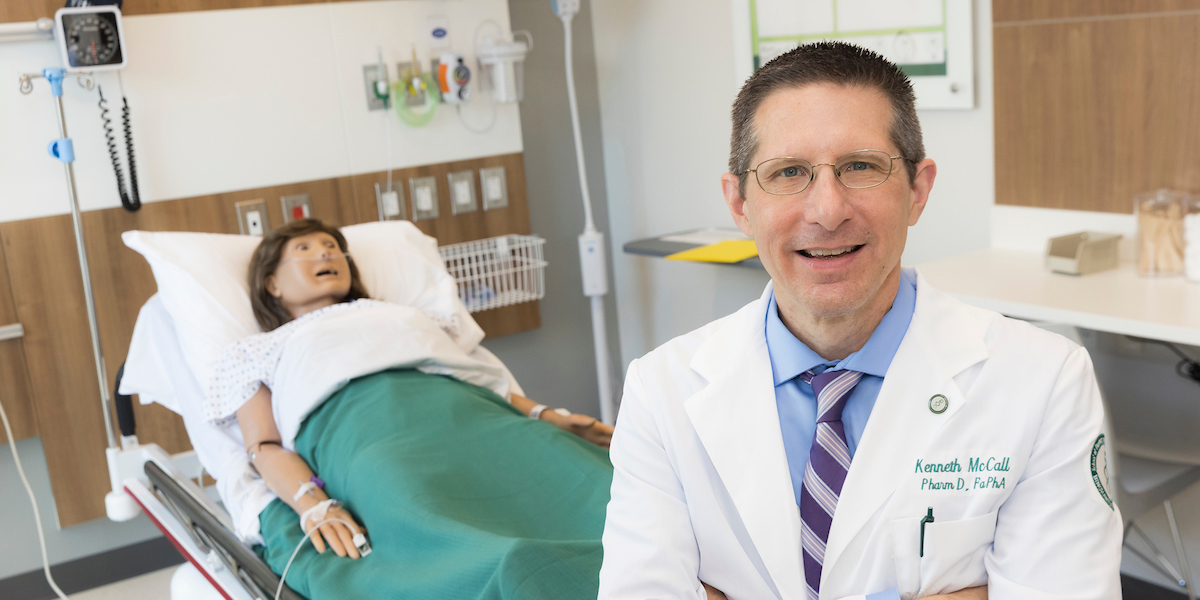Third-generation pharmacist joins Binghamton faculty
Kenneth "Mac" McCall says he might have RPH+ blood type

For a man who loves to hike, Kenneth “Mac” McCall’s move from the state of Maine to the Southern Tier of New York made for any easy transition — there are plenty of great places to hike nearby.
“I enjoy hiking and have to get at least a little bit of outdoor time every week,” he said. “Every weekend I’ve been here, I’ve explored a new park. Salt Springs in Pennsylvania was beautiful. I’ve been to the IBM Glen, the University’s Nature Preserve a couple of times. I went to Cayuga Lake. There is so much good hiking around here. This is a beautiful part of the country.”
McCall, who spent the past 13 years on the faculty of the University of New England School of Pharmacy and also was president of the Maine Pharmacy Association, joined SOPPS a few months ago as a clinical professor and co-chair of the Department of Pharmacy Practice.
He is a third-generation pharmacist, following in the footsteps of his father and grandmother. “My blood type might be RPh+,” he said. Another positive for him? The School of Pharmacy and Pharmaceutical Sciences has a strong mission.
“The school’s mission is compelling because the state of New York is investing in a new Health Sciences Campus, so it’s exciting to be part of that new commitment with new programs coming online in occupational therapy, physical therapy and others, coupled with our pharmacy and nursing programs,” he said. “It’s compelling to look where there’s a need and this is an area where there is a healthcare need and the investment is there.”
His first look at the school was as a candidate and, by nature, from a distance, he said. But once he arrived, it became about the people. “It’s always about people, so for me I knew once I got here that the fit was right because the people here have been very welcoming,” he said. “Their sense of purpose and place is aligned with the mission of this school and the University.”
McCall is also a fan of the Doctor of Pharmacy curriculum.
“What’s unique about the pharmacy curriculum here is a commitment to opportunities for student-engaged research,” he said. “That’s not true of every new school of pharmacy, and the capstone is one of the hallmarks of our curriculum.”
His area of focus is pharmacoepidemiology (population health), and he’s already working with several faculty on research.
“Most of the work I do is using large data sets and making meaning of them,” McCall said, mentioning a few national data sets such as the DEA ARCOS data set that looks at every milligram of opioid use and other drug uses across the nation.
“I’m self-trained to do data analysis, but I’m actually enrolled in an online data science master’s program as well,” he said. “For years, I collaborated with a PhD statistician so I learned these skills by working with colleagues, so though I’m self-taught, I feel very comfortable in both data science and statistics.”
McCall is part of a work group spread across five institutions so when he’s out of his data science/statistics comfort zone it’s easy to reach out for help, he said. “My comfort level is much higher than it was early in my career,” he said. “I believe that we need to engage students in research because they learn many skills that are transferable to diverse career paths in pharmacy and pharmaceutical sciences.”
“Some of the collaborations I’m doing with faculty include evaluating outcomes at their practice sites,” he added. “That’s a little different, as we look at patient-care outcomes associated with their clinical work.”
Once McCall passes his New York state licensing exam, he’ll become able to precept SOPPS students, such as at community events. New York became the fifth state he has been licensed to practice in. “Everywhere you go, you have to take the exam!” he said.
McCall is also teaching this fall, co-coordinating a course in the Skills Lab and the elective JumpStart into Residency, designed to help students reinforce and build upon skills necessary to excel as professionals. He’ll also lecture to first-year pharmacy students.
In his role as co-chair of the Department of Pharmacy Practice, McCall is working with Professor Sarah Spinler to guide the department to the next stage of its development, from mentoring faculty, faculty workload, matters pertaining to practice sites, budgeting and professional development. “Sarah still will handle promotion and tenure,” he said. “I’m leading a professional development series aligned with our monthly department meetings. We surveyed faulty for priority topics and developed a calendar.”
McCall is sharing mentoring responsibilities with Spinler, and together they are co-chairing the department meetings. “I’ll also be responsible for the budget,” he added.
But for McCall, the most fulfilling part of being a faculty member is seeing students succeed.
“It’s really to me why I’m here, so celebrating our graduation every year and the students’ achievements, and keeping the connections with our alumni — I love to hear about their successes,” he said. ”The ways they are making an impact, in industry bringing new drugs to market or in the community practice setting immunizing patients or in hospitals, it’s amazing to keep up with all the ways they are having an impact.”
“Now that my son has been to college, my perspective has changed more,” he said. “When your own child goes through that experience, just as he had mentors in college, I want to be that mentor in terms of supporting professional growth for our students here at SOPPS.”

